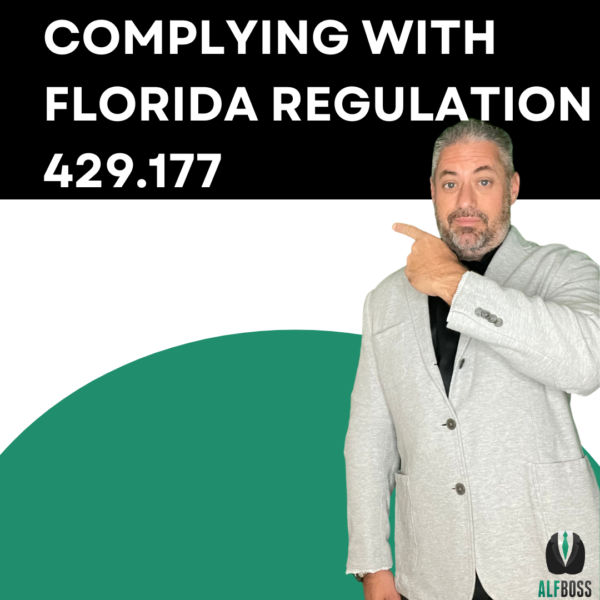
As an assisted living facility in Florida, it is important to be aware of and comply with state regulations such as 429.177, which pertains to the disclosure of services for individuals with Alzheimer’s disease and related disorders.
This regulation requires that any facility that Advertises to provide special care for these individuals must disclose in their advertisements or a separate document, the services that distinguish their care as being applicable or suitable for such persons. In addition, the facility must give a copy of these advertisements or documents to anyone who requests information about programs and services for persons with Alzheimer’s disease or related disorders and maintain copies of all such materials in their records.
To comply with this regulation, here are some suggestions:
- Include a written description in the admission package: In addition to providing a copy of advertisements or a separate document to those who request information, consider including a written description of the special services provided for individuals with Alzheimer’s disease and related disorders in the admission package. This will ensure that all potential residents and their families are aware of the specialized care offered at your facility.
- Advertisements and documents that disclose the special services provided to individuals with Alzheimer’s disease and related disorders. These records should be readily available for review during AHCA inspectionsBy following these suggestions, assisted living facilities in Florida can comply with regulation 429.177 and ensure that they are providing accurate information about the special services provided for individuals with Alzheimer’s disease and related disorders. Compliance with this regulation not only ensures that facilities are meeting legal requirements but also helps to establish trust with potential residents and their families.
Regulation:
429.177 Patients with Alzheimer’s disease or other related disorders; certain disclosures.—A facility licensed under this part which claims that it provides special care for persons who have Alzheimer’s disease or other related disorders must disclose in its advertisements or in a separate document those services that distinguish the care as being especially applicable to, or suitable for, such persons. The facility must give a copy of all such advertisements or a copy of the document to each person who requests information about programs and services for persons with Alzheimer’s disease or other related disorders offered by the facility and must maintain a copy of all such advertisements and documents in its records. The agency shall examine all such advertisements and documents in the facility’s records as part of the license renewal procedure.
Examples of possible services offered.
Assisted living facilities that cater to individuals with Alzheimer’s disease or related disorders typically offer specialized services that meet the unique needs of these residents. Here are some examples of special services that an assisted living facility might offer:
- Memory care programs: These programs are designed to help residents with cognitive impairment maintain their memory and cognitive function through structured activities and exercises.
- Secure and structured environment: Facilities may offer secure and structured environments to help reduce the risk of residents wandering and ensure their safety.
- Nutritious meals: Many residents with Alzheimer’s disease or related disorders have difficulty with eating and may require assistance or specialized diets. Assisted living facilities may offer nutritious meals tailored to the specific needs of these individuals.
- Personalized care plans: Assisted living facilities may create personalized care plans for each resident that take into account their individual needs and preferences.
- Social and recreational activities: Assisted living facilities may offer social and recreational activities that are designed to promote engagement and socialization among residents with Alzheimer’s disease or related disorders.
- Trained staff: Facilities may have staff that are specifically trained in caring for individuals with Alzheimer’s disease or related disorders, including dementia-specific training.
- Family support services: Assisted living facilities may offer family support services, such as support groups or educational seminars, to help families understand and cope with the challenges of caring for a loved one with Alzheimer’s disease or related disorders.
These are just a few examples of the specialized services that an assisted living facility might offer to residents with Alzheimer’s disease or related disorders. Each facility may have its own unique set of services and programs designed to meet the needs of its residents.